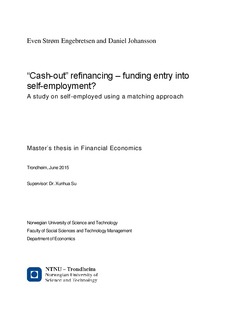“Cash-out” refinancing – funding entry into self-employment? - A study on self-employed using a matching approach
Master thesis
Permanent lenke
http://hdl.handle.net/11250/2381984Utgivelsesdato
2015Metadata
Vis full innførselSamlinger
Sammendrag
In recent years, the Norwegian housing prices and household debt to disposable income have reached extraordinary new heights. Su et. al (2014) points to cash-out refinancing as one of the key drivers behind the debt to income ratios. As a contribution to more knowledge about the real effects of cash-out refinancing, the present thesis studies a causal relationship between entry into self-employment and cash-out. The study has two main findings. First, a sizeable amount of the total cash-out appears to be an effect of the entry into self-employment, indicating that cash-out refinancing is to some degree used as funding for starting businesses. Second, cash-out for funding entry into self-employment is substantially higher for women, supporting previous research showing that women attracts less start-up capital than men. Our results contrasts previous findings where cash-out has first and foremost been related to financial difficulties, which may have potential destabilizing consequences (Mian and Sufi, 2011). Our study indicates that there are still some unexplained effects regarding cash-out. Hence, our findings call for more research on what the cash-out is used for, to further enlighten the real effects to the national economy.
